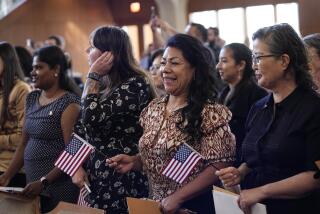California leads U.S. in immigrant entrepreneurship, study finds
When Gloria Suen opened a retail shop in Chinatown, she and her sister knew so little English they could barely decipher the rules and regulations that govern small businesses. But she asked advice from anyone who would listen and persevered.
“In those days, I had to work 365 days a year from 8 a.m. to 10 p.m.,” she said. “I had to, little by little, learn.”
Today her family-owned small business, Li Hing of Hong Kong, sells ornate Chinese antiques and fine crafts to businesses and homes across the U.S.
Li Hing is part of a movement pushing California to the forefront of a national trend: The state leads the nation in the percentage of businesses owned by immigrants, a share that exceeds the demographic’s proportion of the general population.
One-third of small-business owners in the state are immigrants, according to a report published Thursday by the Fiscal Policy Institute, a New York-based think tank. About 27% of the state’s population was born in a foreign country, according to the 2010 U.S. Census.
Los Angeles has the second highest concentration of immigrant small business owners among metropolitan areas — 44%, one percentage point behind Miami. Immigrants make up 34% of the greater Los Angeles population, according to the U.S. Census Bureau.
The most common countries of origin for immigrant small business owners in the greater Los Angeles area are Mexico, Korea, Iran, Taiwan and Vietnam, said David Dyssegaard Kallick, of the Fiscal Policy Institute.
“I think people have been very much aware of the growing immigrant population over the last 20 years but not nearly so much of growing immigrant entrepreneurship,” Kallick said.
Compared with U.S.-born workers, immigrants are about 10% more likely to be small-business owners. Although immigrants make up about 13% of the national population, they constitute 18% of small business owners, according to the report. Twenty years ago immigrants were about 12% of owners, at a time when they were about 9% of the labor force, according to the study.
Certain types of businesses have large concentrations of immigrant owners, according to the report. About 37% of restaurant owners, 49% of grocery store owners and 54% of those who own laundry and dry cleaners are immigrants. Immigrants are also likely to own doctor’s offices, real estate firms and truck transportation services.
The study is based on an analysis of the U.S. Census Bureau’s Survey of Business Owners and the American Community Survey.
“Although much of the discussion about immigration is about immigrants who come to work, it’s also true that immigrants come and start businesses and buy homes,” said Stephen Levy, director and senior economist at the Center for Continuing Study of the California Economy in Palo Alto.
Colleen Seto, program manager at the Asian Pacific Islander Small Business Program, which counsels Asian entrepreneurs, said many clients come to her organization wanting to start businesses after having lost jobs. Those new entrepreneurs and existing owners also find it difficult to get credit in the struggling economy, she said.
Kallick, who wrote the report, said many immigrants start their own businesses after struggling in the job market.
“Immigrants sometimes have a hard time finding their way into a regular job that pays benefits and has stability, and they start businesses because they have no other choice,” he said. “Sometimes there’s a happy ending to that story. Sometimes it works out better for them. Sometimes it doesn’t.”
Like Li Hing imports, many immigrant-owned businesses started small and have expanded to compete with larger businesses.
Three decades ago, Mexican immigrant Miguel Gonzalez Reynoso sold his home and his father took out a second mortgage to open a grocery store in Anaheim. Reynoso and his father saw a need — most Mexican grocery stores at the time were small and cramped; larger chain stores didn’t offer Mexican products.
During its first year, he and his siblings were the only employees.
They “worked long days for low pay so we could keep most of the money inside the business and run it so we could grow,” Reynoso said.
Today there are 34 Northgate Gonzalez Markets throughout Southern California that, in addition to the typical grocery store offerings, sell fresh pan dulce, tortillas and other Mexican specialties. The business supports thousands of workers.
His success, Reynoso said, is “thanks to this great country that really is the land of opportunity.”
More to Read
Start your day right
Sign up for Essential California for news, features and recommendations from the L.A. Times and beyond in your inbox six days a week.
You may occasionally receive promotional content from the Los Angeles Times.







